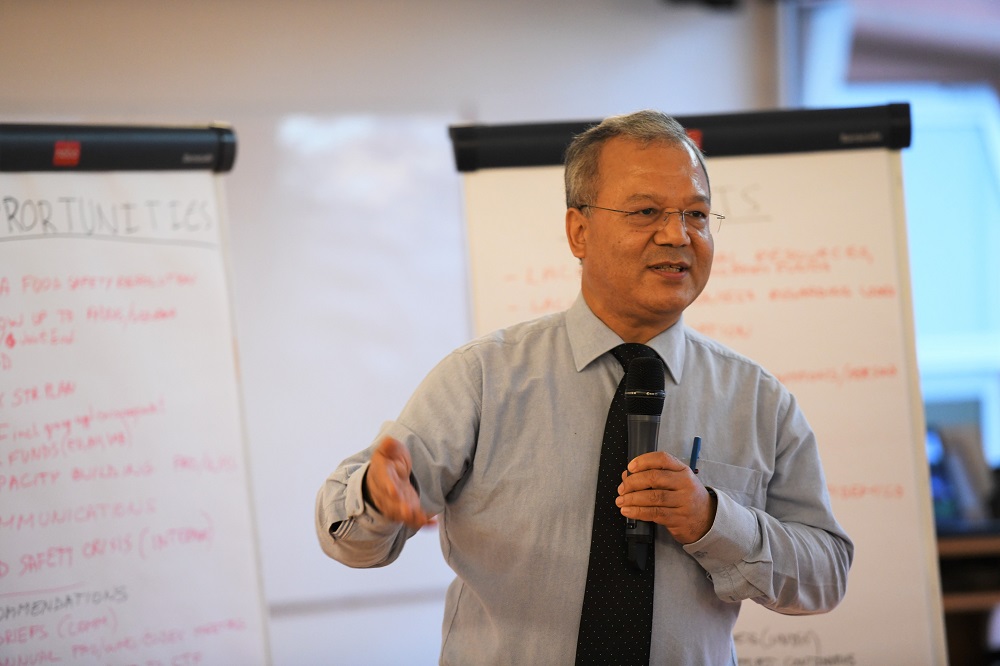Gyanendra Gongal appointed WHO Regional Adviser for food safety in South-East Asia
Gyanendra Gongal, from Nepal, has recently been appointed WHO Regional Adviser for food safety in the WHO Regional Office for South East Asia (SEARO), the first time in two decades, in his words, that someone will be working full time on food safety in the region.
His new role involves providing technical leadership, supporting the Codex Trust Fund (CTF), and working on policy advocacy, Codex, risk assessment, food safety emergency and INFOSAN activities.
Why are you excited about the new position?
There hasn’t been a dedicated person for food safety in the region for the past two decades. World Health Day 2015 was dedicated to food safety and I was assigned to carry out preparatory work including organization of an event. Since then, I have been supporting food safety activities in addition to working on International Health Regulations (IHR), zoonoses and One Health. Food safety is one of the capacities required for IHR implementation and one of the 19 technical areas for joint external evaluation. I have 13 years of experience with IHR, zoonoses and One Health, which will be critical when it comes to mobilizing resources and promoting multisector collaboration for food safety.
WHO SEARO developed the ‘Framework for Action on Food Safety in WHO South East Asia Region’ and there will be a proposal on Food Safety at the World Health Assembly Resolution this year.
It was a great honour to support Bhutan, India and Nepal to get the first CTF project for a group Codex activity which is ongoing. Definitely, it is an exciting moment and a challenge to meet expectations from Member States and WHO leadership as the first person to hold this post.

Gyanendra Gongal, WHO Regional Adviser for food safety
What specific food safety challenges will be priorities?
The burden of foodborne disease in the region is the second highest among all WHO regions, accounting for 150 million illnesses, 175 000 deaths, and 12 million disability-adjusted life-years (DALYs) in 2010. Food safety in the region has been continually compromised by food fraud practices through deliberate illegal substitution, mislabeling, counterfeiting and adulteration of food products. Member States face difficulty in dealing with cross-sectoral communication, coordination and collaboration among competent authorities. There is limited understanding of roles and responsibilities, which often results in confusion on some crosscutting issues among food safety implementing agencies.
Priorities will include strengthening National Codex Committees and Member States’ active participation in the Codex standard setting process through multi-country activities. We will also be developing a food safety risk analysis training module as well as other capacity building based on programmes we ran under CTF. I will also be testing communication and coordination between National IHR Focal Points and INFOSAN Emergency Contact Points through a simulation exercise.
What part of your work will deal with Codex?
Codex work is key as all Member States are involved in international trade of food and food products (import or export). Bhutan, India and Nepal were able to secure a group project under the Codex Trust Fund and other countries are also applying. Strengthening national Codex structures in Member States and active participation in the Codex standard setting process are priorities for us.
Why does this appointment come at a critical time?
Last year, two international food safety conferences were organized which provided impetus for political advocacy and commitment and Member States have high expectations from UN agencies and international partners. Senior management recognise that it is not possible to meet expectations with part time assignments. Taking the opportunity of WHO transformation and a possible World Health Assembly resolution on food safety, regional management are placing strong emphasis on food safety as a shared responsibility.
What will be the keys to success and what will success look like?
I will be looking for support and cooperation from senior management and other technical units and departments dealing with food safety related activities. We must ensure we provide technical leadership for multisector coordination and resource mobilization and Member States will need to feel they own the regional initiatives.
We will have made progress when we have successful advocacy and implementation of our ‘Framework for Action’ in WHO SEAR and when we see functional national Codex structures up and running in Member States.
Read more
Categories
- (11)
- (3)
- Animal Feed (8)
- Antimicrobial Resistance (39)
- Antimicrobial Resistance (77)
- CAC46 (15)
- Codex Texts (20)
- Codex Trust Fund (1)
- Codex60 (19)
- Contaminants (13)
- Contaminants (10)
- COVID-19 (64)
- Elections (6)
- Food Safety (126)
- Labelling (10)
- Nutrition and Labelling (5)
- Nutrition and Labelling (7)
- Observers (23)
- Pesticides (7)
- Standards (78)
- World Food Safety Day (154)


